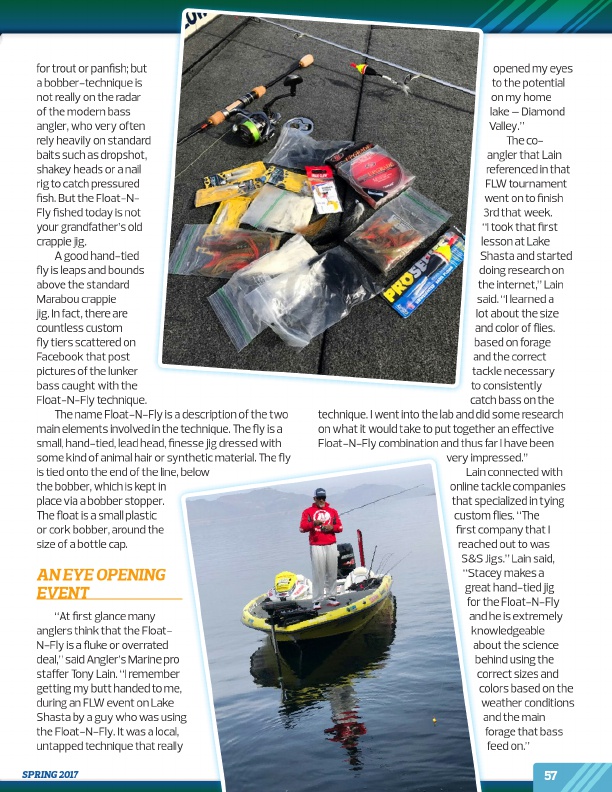
for trout or panfish; but a bobber-technique is not really on the radar of the modern bass angler, who very often rely heavily on standard baits such as dropshot, shakey heads or a nail rig to catch pressured fish. But the Float-N- Fly fished today is not your grandfather’s old crappie jig.
A good hand-tied fly is leaps and bounds above the standard Marabou crappie jig. In fact, there are countless custom fly tiers scattered on Facebook that post pictures of the lunker bass caught with the Float-N-Fly technique.
The name Float-N-Fly is a description of the two main elements involved in the technique. The fly is a small, hand-tied, lead head, finesse jig dressed with some kind of animal hair or synthetic material. The fly is tied onto the end of the line, below the bobber, which is kept in place via a bobber stopper. The float is a small plastic or cork bobber, around the size of a bottle cap.
AN EYE OPENING EVENT
“At first glance many anglers think that the Float- N-Fly is a fluke or overrated deal,” said Angler’s Marine pro staffer Tony Lain. “I remember getting my butt handed to me, during an FLW event on Lake Shasta by a guy who was using the Float-N-Fly. It was a local, untapped technique that really
SPRING 2017
opened my eyes
to the potential
on my home
lake – Diamond
Valley.”
The co-
angler that Lain
referenced in that
FLW tournament
went on to finish
3rd that week.
“I took that first
lesson at Lake
Shasta and started
doing research on
the internet,” Lain
said. “I learned a
lot about the size
and color of flies.
based on forage
and the correct
tackle necessary
to consistently
catch bass on the technique. I went into the lab and did some research on what it would take to put together an effective Float-N-Fly combination and thus far I have been
very impressed.”
Lain connected with
online tackle companies
that specialized in tying
custom flies. “The
first company that I
reached out to was
S&S Jigs.” Lain said,
“Stacey makes a
great hand-tied jig
for the Float-N-Fly
and he is extremely
knowledgeable
about the science
behind using the
correct sizes and
colors based on the
weather conditions
and the main
forage that bass
feed on.”
57